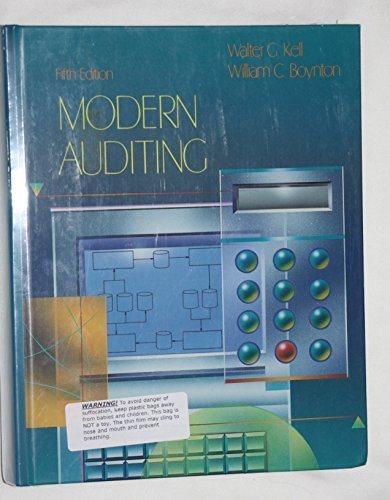The limitations on the CPA's professional responsibilities when he is associated with unaudited financial statements are often
Question:
The limitations on the CPA's professional responsibilities when he is associated with unaudited financial statements are often misunderstood. These misunderstandings can be substantially reduced by carefully following professional pronouncements in the course of his work, and taking other appropriate measures.
Required:
The following list describes seven situations the CPA may encounter, or contentions he may have to deal with in his association with and preparation of unaudited financial statements. Briefly discuss the extent of the CPA's responsibilities and, if appropriate, the actions he should take to minimize any misunderstandings. Number your answers to correspond with the numbering in the following list.
1. The CPA was engaged by telephone to perform write-up work including the preparation of financial statements. His client believes that the CPA has been engaged to audit the financial statements and examine the records accordingly.
2. A group of businessmen who own a farm which is managed by an independent agent engage a CPA to prepare quarterly unaudited financial statements for them. The CPA prepares the financial statements from information given to him by the independent agent. Subsequently, the businessmen find the statements were inaccurate because their independent agent was embezzling funds. The businessmen refuse to pay the CPA's fee and blame him for allowing the situation to go undetected contending that he should not have relied on representations from the independent agent.
3. In comparing the trial balance with the general ledger the CPA finds an account labeled "audit fees" in which the client has accumulated the CPA's quarterly billings for accounting services including the preparation of quarterly unaudited financial statements.
4. Unaudited financial statements were accompanied by the following letter of transmittal from the CPA.
We are enclosing your company's balance sheet as of June 30, 19X0, and the related statements of income and retained earnings and changes in financial position for the six months then ended which we have reviewed.
5. To determine appropriate account classification, the CPA reviewed a number of the client's invoices. He noted in his working papers that some invoices were missing but did nothing further because he felt they did not affect the unaudited financial statements he was preparing. When the client subsequently discovered that invoices were missing he contended that the CPA should not have ignored the missing invoices when preparing the financial statements and had a responsibility to at least inform him that they were missing.
6. The CPA has prepared a draft of unaudited financial statements from the client's records. While reviewing this draft with his ciient, the CPA learns that the land and building were recorded at appraisal value.
7. The CPA is engaged to review without audit the financial statements prepared by the client's controller. During this review, the CPA learns of several items which by generally accepted accounting principles would require adjustment of the statements and footnote disclosure. The controller agrees to make the recommended adjustments to the statements but says that he is not going to add the footnotes because the statements are unaudited.
Step by Step Answer:

Modern Auditing
ISBN: 9780471542834
5th Edition
Authors: Walter Gerry Kell, William C. Boynton, Richard E. Ziegler





